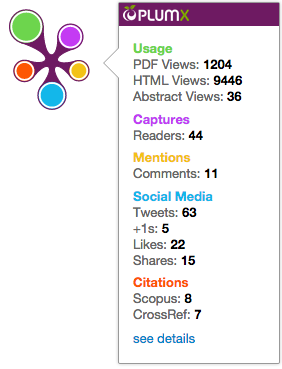Bibliometrics
Bibliometrics is defined by Thomson Reuters as a way to evaluate research performance with citation data. Typically, bibliometrics involves measuring impact by counting citations, specifically by counting how many times a particular work has been cited by other works. It is also referred to as "traditional" metrics, because bibliometrics' figures such as the h-index, impact factor, and Eigenfactor have long been used in hiring and promotion decisions for faculty in certain fields.
View our Citation Analysis page for definitions of terms, help with citation analysis, and tools to get you started.
Alternative Metrics ("Altmetrics")
Altmetrics provide an alternative for measuring impact at the article or item level. The Altmetric score, displayed in a colorful donut badge, tracks the sharing and dissemination of scholarship in real time over various channels.
- Number of shares on social media (Twitter, Facebook, Google+)
- Number of saves on social bookmarking sites and research managers (Mendeley, CiteULike, Slideshare)
- Number of downloads or views
- Number of blogs, news sites, and other commentary
View our Altmetrics page for more information.
PlumX Analytics
Plum Analytics is an Elsevier-owned product that provides author and article-level metrics. Institutional-level metrics are available under a separate subscription. Metrics are categorized into 5 types: Usage, Captures, Mentions, Social Media, and Citations.
The PlumX widget displays for results retrieved in Health Information @ Himmelfarb, the search box on the library homepage. Clicking on the widget to the left hand side of an article record will show you more details and metrics. The institutional repository Health Sciences Research Commons automatically includes PlumX metrics.

Emerging Models
1. The Becker Model
The Becker Medical Library Model for Assessment of Research Impact is a list of indicators to document evidence of biomedical research impact. The indicators are organized according to the following pathways:
- Advancement of Knowledge : How were research output and activities used? How was awareness of research output demonstrated?
- Clinical Implementation : How was translation of research output and activities into clinical applications demonstrated?
- Community Benefit : How was community health enhanced as a result of research output and activities?
- Legislation and Policy : How did research output and activities influence or result in enactment of public law, guidelines, standards, or policy?
- Economic Benefit : What economic outcomes were produced from research output and activities?
Find out more about using the Becker Model to gauge the impact of your research:
- The Becker Model
- The Becker Model Reference (PDF)
- How To Use
- Enhancing Your Impact
- Information and Resources
- Glossary of Resources
- Glossary of Terms
2. Dimensions
Dimensions.ai is a new citation and research analytics database that links connections between academic articles, monographs, clinical trials, grey literature, and grant information. Similar to Elsevier's Scopus and Clarivate's Web of Science, Dimensions tracks traditional citation-counts, as well as emerging modes of metrics such as Altmetric scores. Researchers can try out the free version of Dimensions; an institutional paid version is also available.
Read more about Dimensions in Library Journal and The Scholarly Kitchen blog.
ImpactStory
ImpactStory is an open-source web-based tool that helps researchers explore and share the diverse impacts of all their research products--traditional ones like journal articles, but also alternative products like blog posts, datasets, and software.
- Web-based application makes it easy to track the impact of a wide range of research artifacts.
- Aggregates impact data from many sources, from Mendeley to Twitter, and also includes Scopus and PubMed.
- Output is displayed in a single, permalinked report.
Get started with ImpactStory (registration required).
Sample Report:

Information reused with permission rom University College Dublin Library's guide to Bibliometrics: https://libguides.ucd.ie/bibliometrics/




